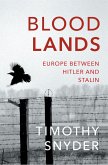After WWII, Europe was awash in refugees. Never in modern times had so many been so destitute and displaced. No longer subjects of a single nation-state, this motley group of enemies and victims consisted of Jewish survivors of the Holocaust, ex-Soviet POWs, ex-forced laborers in the Third Reich, legions of people who fled the advancing Red Army, and many thousands uprooted by the sheer violence of the war. This book argues that postwar international relief operations went beyond their stated goal of civilian "rehabilitation" and contributed to the rise of a new internationalism, setting the terms on which future displaced persons would be treated by nations and NGOs.
Dieser Download kann aus rechtlichen Gründen nur mit Rechnungsadresse in A, B, BG, CY, CZ, D, DK, EW, E, FIN, F, GR, HR, H, IRL, I, LT, L, LR, M, NL, PL, P, R, S, SLO, SK ausgeliefert werden.









